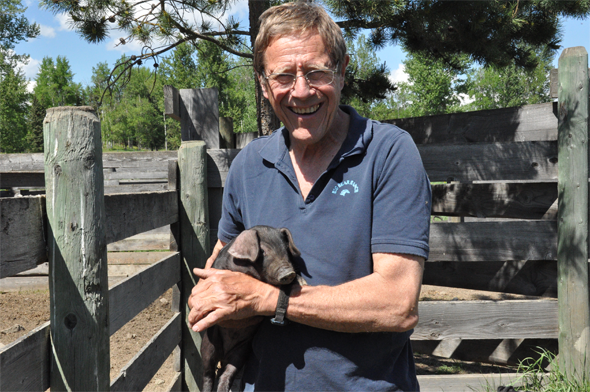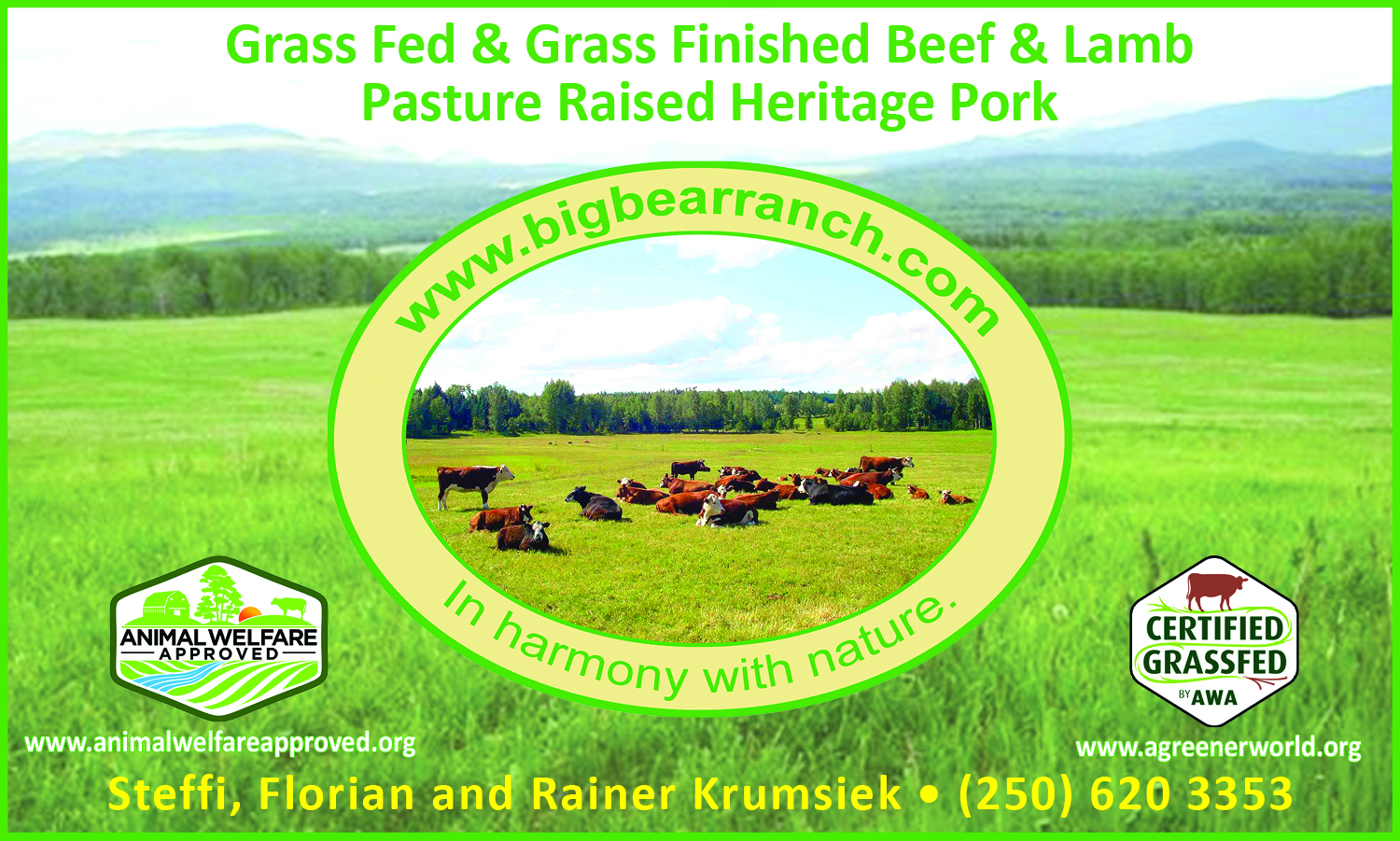By LeRae Haynes –
Rainer Krumsiek at Big Bear Ranch in Horsefly believes that raising perfect animals for perfect food starts with perfect soil. His holistic ranching approach focuses on a balance between land, plants, animals, and people, and highlights the importance of humane and respectful treatment of animals.

Cows, sheep, pigs, and turkeys flourish at Big Bear Ranch, and everything is born on the ranch except for the turkeys. Free-range, grass-fed, and nurtured with natural, quality nutrients from the land, the animals have a great quality of life and provide pure nutrition for Big Bear customers throughout the province.
Krumsiek works 1,200 acres with the help of his son Florian and daughter-in-law Steffi. Their innovative, holistic ranching style has resulted in a list of approximately 600 happy customers in BC, including many young families, who see the importance and the benefits of meat raised the Big Bear way.
Meat from the ranch is delivered once a month on a route that covers Williams Lake, Cache Creek, Kamloops, Vernon, Winfield, Kelowna, Merritt, Hope, Chilliwack, Abbotsford, Surrey, Burnaby, North Vancouver, Vancouver, and Steveston.
Krumsiek, his wife Gigi, and their three children moved from Germany to Kelowna in 1993 and bought the property in Horsefly in 1995. He said in Germany they had a huge garden and raised their own vegetables, had chickens, and hunted wild game. After owning a high-end landscaping business in Germany for 25 years, they felt burned out and decided it was time for a change.
“We got 106 cows our first year here on the ranch,” he explained. “The only thing I knew about cows was what I learned as a kid going to my uncle’s dairy farm during holidays. At that time they brought the cows to a pasture in the summer and went out with a tractor to milk them in the pasture. These cows were moved from pasture to pasture, and sometimes we had to move them across a public road. That’s what I knew about cows.
“And then we moved here and I learned from Duncan Barnett how to move cows with low-stress livestock handling. Not with hitting and yelling, but with your body.”
He said in the beginning they would buy and raise two weaner pigs a year for meat, but added that more and more people asked about pork. “When the time came that it was almost impossible to get the pigs to raise, we got a sow and bred it with the neighbor’s Duroc boar.
“We got a pair of sheep and started raising them for meat, too, and we bring in turkey chicks to raise. We do 100 turkeys every year and they are sold out for Thanksgiving and Christmas.”
He said healthy soil cannot be stressed enough—that it is the first secret to healthy plants, healthy animals, and healthy meat.
“Healthy soil starts with electric fence system so that you have control over where your animals are; especially in the fast-growing season it’s important to have them no more than two days in the same spot,” he explained.
“Even though grass can grow two or three inches a day, a cow has certain plants she prefers to eat, so she goes back the next day to her favourite plant. The plant may have grown back a little, but when it’s eaten down again it takes reserves from the roots. Then the cow comes back and the process repeats again and again, and finally the plant dies. Poor-growing plants and weeds come in and take over.”
He said because the root system takes far longer to recover than the plant itself, the grass may look like it’s ready to graze, but the root system is not. “I found out that 60-90 days of rest is the minimum,” he said. “In some areas where it’s rockier, though, it might take a year. Now that I have this figured out I can take the same field and graze it twice in a year and make hay on it once.”
He noted that the second thing for healthy soil is a water system you can move with the animals. At Big Bear there are moveable water troughs with a hose system, where water troughs are placed under the fence between the field where the animals are and the field where they’re going the next day.
“When an animal has that kind of grazing it is far more content because it has a higher plain of nutrition,” he added. “It enables us to finish them in the second year.”
He also explained that rotating species is a good way to keep animals healthy. “Pigs are the best for improving a pasture—you buy the certified organic pig feed and 80-90 percent of it goes into the soil as droppings and it helps with parasite control,” he said. “Every species has different parasites with a certain lifespan. Parasites in cattle, for example, multiply every four weeks, and with continuous grazing, there is more of a worm load. If you move the animals, with a 60-90 day rest for the pasture, that’s enough time for the parasites to die off.
“Ranching this way means far lower vet bills for treating parasites. We’ve had a zero vet bill for worming since we have used Management Intensive Grazing.”
Because life in the soil is destroyed the moment you add artificial fertilizer, Krumsiek said he adds excellent natural compost to a pasture by species rotation. “We have sheep in the barn over the winter and end up with a two-foot layer of hay and droppings that we move outside in the spring. The pigs dig in it and move it around – it gets moved a few times – and it creates excellent compost in the pasture,” he said, adding that he feeds three to four tonnes of kelp, and four tonnes of Redmond Sea Salt to all his animals each year.
“When we eat meat grown in this way it is huge health benefits to us,” he said. “There are high conjugated linoleic acid levels, the Omega 3-6 ratio is right, and there are healthy photon levels from the sun.”
Organic agriculture doesn’t mean choosing between environmental benefit and financial benefit, said Krumsiek, adding it has been proven that organic agriculture can feed the world, and you make more money at it than you do with industrial agriculture. He noted that the cost of producing is so much lower per acre—you spend less on fuel, fertilizer, and pesticides, and your yield is higher.
He said today more and more people want to know what’s in their food. “If people buy quality, they recognize it and they keep on buying it,” he said. “What surprised me when selling at the farmer’s market over the years, and on our delivery route, was the kind of people who bought it. I thought it would be people my age, but most are between 25 and 40 years old. Young families having kids are really caring and trying to learn about food. It’s getting better and better.
“And there are more and more young people getting into farming. It’s uplifting to see.”
It’s important to be careful with labels, said Krumsiek, even ones that say ‘organic.’ He explained that most people think ‘organic’ is not doing something bad, and that’s okay, but that it really means doing things better, and with a higher standard.
“Every week I have new inquiries on my website. People ask me about three things: are the animals grass fed, how are the animals handled, and is it certified organic? In that order,” he added. “Organic is in third place, to my surprise.”

Big Bear Ranch has applied to A.W.A. or Animal Welfare Approved, which is a food label for meat and dairy products that come from farm animals raised to the highest animal welfare and environmental standards. The program was founded in 2006 as a market-based solution to the growing consumer demand for meat, eggs, and dairy products from animals treated with high welfare and managed with the environment in mind. Krumsiek said they are coming in June to inspect his ranch, as well as the butcher he uses.
“How my animals are treated matters a great deal to my customers,” he said, “and it matters to me.”
For more information about A.W.A. or Animal Welfare Approved, visit www.animalwelfareapproved.org and for more information about Big Bear Ranch visit www.bigbearranch.com, email Rainer Krumsiek at info@bigbearranch.com, or call (250) 620-3353.
LeRae Haynes is a freelance writer, song writer, community co-ordinator for Success by 6, member of Perfect Match dance band, and instigator of lots of music with kids.
